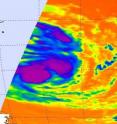Still safely at sea, Edzani now a tropical storm
The weekend wasn't very helpful to Edzani, once a powerful Cyclone, now weakened to a tropical storm in the Southern Indian Ocean. That's because of cooler waters and increased wind shear. On Monday, January 11 at 10 a.m. ET (1500 UTC) Edzani's maximum sustained winds were near 52 mph (45 knots). Edzani's center was about 970 nautical miles east-southeast of La Reunion island, near 26.0 South and 72.3 East. Edzani was moving south-southeast near 13 mph, but the storm is expected to turn to the southwest in the next day. It will still remain in open waters and poses no threat to land.
When NASA's Aqua satellite flew over Edzani on Friday, January 8, it was still a tropical cyclone. Over the weekend it hit cooler waters and windshear which have really weakened the storm. On January 8, infrared satellite imagery from the Atmospheric Infrared Sounder (AIRS) instrument on Aqua showed Edzani as a tight rounded storm. Since then, it has lost its "roundness" and has become somewhat asymmetrical.
Satellite data has revealed that Edzani's low level center of circulation has become exposed, and that it's convection, which is now confined to the eastern half of the system is decreasing. Both of those factors indicate a weakening storm. Another thing tearing at the storm is vertical wind shear, which has increased over the last 12 hours.
Forecasters now expect Edzani to continue weakening further and dissipate by mid-week.
Source: NASA/Goddard Space Flight Center
Articles on the same topic
- NASA satellite sees Tropical Storm Edzani becoming extra-tropicalWed, 13 Jan 2010, 20:25:43 UTC
- NASA satellite sees rainfall in ebbing EdzaniTue, 12 Jan 2010, 16:08:17 UTC
- Super cyclone Edzani staying safely at sea spawning super swellsFri, 8 Jan 2010, 21:16:25 UTC
Other sources
- NASA satellite sees Tropical Storm Edzani becoming extra-tropicalfrom PhysorgWed, 13 Jan 2010, 20:56:27 UTC
- NASA satellite sees rainfall in ebbing Edzanifrom PhysorgTue, 12 Jan 2010, 19:21:25 UTC
- NASA satellite sees rainfall in ebbing Edzanifrom Science BlogTue, 12 Jan 2010, 17:14:36 UTC
- Still safely at sea, Edzani now a tropical stormfrom Science BlogMon, 11 Jan 2010, 19:42:15 UTC
- Still safely at sea, Edzani now a tropical stormfrom PhysorgMon, 11 Jan 2010, 19:14:16 UTC
- Super cyclone Edzani staying safely at sea spawning super swellsfrom Science BlogFri, 8 Jan 2010, 23:28:10 UTC
- Super cyclone Edzani staying safely at sea spawning super swellsfrom PhysorgFri, 8 Jan 2010, 21:35:09 UTC
- Super cyclone Edzani staying safely at sea spawning super swellsfrom Science BlogFri, 8 Jan 2010, 21:14:24 UTC
